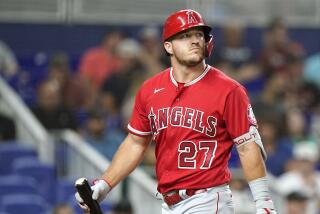It’s one concussion and ‘you’re out’ at the old ballgame
- Share via
It must have been a blow to Minnesota Twins fans to learn earlier this week that slugger Justin Morneau will not play in the major league baseball playoffs due to lingering effects of a concussion. But the high-profile case can, and should, set an example to athletes of all abilities on the importance of taking head injuries seriously, said a leading expert on concussions.
Morneau was batting .345 with 18 homers when he slid into second base during a July 7 game and collided with Toronto’s second baseman. Morneau was diagnosed with a concussion. But for reasons that doctors can’t explain, sometimes symptoms of a concussion linger. Morneau said this week that he is still has symptoms.
The wealth of evidence showing concussions are serious brain injuries that can lead to long-term neurological damage is beginning to influence a generation of athletes, from pro to rec leagues, said Dr. Richard G. Ellenbogen, chief of neurosurgery at Harborview Medical Center in Seattle, and co-chairman of the NFL’s head, neck and spine medical committee.
Post-concussion syndrome -- also called post-concussive syndrome -- was referred to as shell shock in military circles in the past. It consists of symptoms such as headaches, cognitive difficulties (such as difficulty concentrating), irritability and fatigue that a person experiences weeks, months or even a year after a concussion. Doctors don’t know why some people experience post-concussion syndrome and others don’t.
“Post-concussive syndrome occurs when all the symptoms you had with the concussion start coming back,” he said. “I see this in male, female, young, old, amateur and professional athletes. This guy has a pretty significant one.”
Oftentimes, a brain scan will show nothing amiss, but the symptoms return when the patient begins activity again, Ellenbogen said. Rest is the only remedy. Studies show that returning to action, and risking further head trauma, can contribute to long-term health problems, such as dementia.
Morneau’s decision adheres to medical guidelines that call for rest until the symptoms are completely gone.
“What we’re seeing happen is a culture change in sport,” Ellenbogen says. “We’re taking concussions seriously because we’re seeing the long-term sequelia. We’re realizing concussions are not good for you.”
Morneau expressed concern about his long-term health when he talked with reporters earlier this week.
“I think the biggest thing the doctor said to me was, ‘I’m confident you’ll get better, confident you’ll be ready for spring training, but if you go out there and get hit again I don’t want you to be feeling like this when you’re 50,’ ” Morneau told the Associated Press. “That’s kind of what made me realized that there is the potential for this to carry on for a long time, and I think that’s definitely what we’re trying to avoid.”
The decision by a high-profile athlete to put his health before a possible World Series ring should send an important message to athletes of all levels, Ellenbogen said. The number of children in the U.S. seeking emergency medical care for concussions incurred playing competitive sports more than doubled in the five years leading up to 2005, according to a study published recently in the journal Pediatrics.
“This is enlightened, judicious handling on the part of the [Twins] organization,” Ellenbogen said. “Here is a star athlete sitting out. It’s not about winning anymore; it’s about being safe.”
-- Shari Roan / Los Angeles Times
Return to Booster Shots blog.
More to Read
Go beyond the scoreboard
Get the latest on L.A.'s teams in the daily Sports Report newsletter.
You may occasionally receive promotional content from the Los Angeles Times.










